“I believe there is an ethic of reading, a responsibility in how we read, a commitment that is both political and private in the act of turning the pages and following the lines. And I believe that sometimes, beyond the author’s intentions and beyond the reader’s hopes, a book can make us better and wiser.” Part of his first essay in A Reader on Reading, Alberto Manguel discusses, as he does throughout his career, the role reading has on our lives.
A self-proclaimed lifelong reader and accidental writer, Manguel has worn many hats in his life, a diplomat’s son, a ‘wandering jew,’ an Argentinian, a Canadian, the apprentice of Borges, and finally a writer. However, there seems to be one thing that supersedes all throughout his life: his identity as a reader. Reading has been his constant passion, and honestly what has differentiated his writing from that of so many other essayists, biographers, and novelists—I say that because Manguel carries all of these titles in his body of work.
Having had a diverse career in literature, Manguel has written a biography of Kipling, novels on the Argentine military dictatorship, and even co-authored a dictionary of imaginary places, his first-ever published work. However, most of his readers will have come to know him through his essay collections, all of which have equal parts social and literary criticism and memoir to them.
Nonetheless, the thing that unites all of Manguel’s work is his utter fascination with literature, his absolute joy and love for it. With that in mind I can safely say he is the writer for readers, very much like you and me, who dwell on the importance of literature in our lives. Who think about the political implications of literary representation, and how society’s virtues and vices have been shaped through the stories we tell our selves.
So, if you are that kind of reader, if you just love to read, period, Manguel has something for you. This list is by no means all-encompassing, as that would make it too big to manage. But I hope it gives you an incentive to explore one of the most insightful authors of our time.
Essays and Books About Books
(1980)
Written in collaboration with Italian editor and writer Gianni Guadalupe, this was Manguel’s first published work. It started as a personal project between friends and soon became much more. Standardized to feel and look like a dictionary, this book is essential for fantasy fans who always wanted to have an atlas, dictionary, and almanac all in one regarding their favorite fictional places. With over 1,200 realms from Homer’s Greece to Middle-earth, this book is the perfect reading companion to any fantastical tale. Plus it has been recently updated!
A History of Reading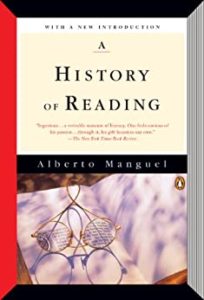 (1996)
(1996)
Looking at every form of reading from clay tablets to the then-new digital platforms, Manguel explores his own trajectory as a leader through the history of his favorite hobby. Exploring the cultural significance, stereotypes, and mediums around reading. Like all of Manguel’s essay collections, this one carries deeply personal anecdotes. But also very in-depth insights into the literary world, and how reading has changed human life continuously.
The Library at Night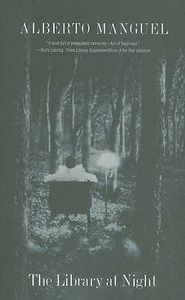 (2006)
(2006)
“A library is an autobiography of the reader’s mind”. Maybe Manguel’s most famous title, the titular essay has become such a staple in bookish writing, and even got a dedicated phenomenal exhibit at the library of Montreal. Discussing the lives of libraries around the world and throughout history, both real and not, Manguel opens the doors of Dickens’s and Borges’s personal libraries, next to odes and imagining the possibilities of The Library of Alexandria and Captain Nemo’s underwater collection. A definite must-read for every book lover.
A Reader on Reading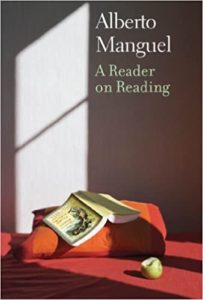 (2010)
(2010)
Some of Manguel’s most impactful essays, A Reader on Reading, take a queue from Alice’s Adventures in Wonderland for each of its pieces to discuss life, love, reality, politics, and truth. From Borges and Dante’s literary relationship, the prejudice against LGBTQ literature and literature’s ability to tell truth to power, this collection of essays explores all facets of human life in society through books and the written word. Manguel chronicles his journey as a writer and how he has come to define himself through the books he has read, as he states: “The reader I am judges the writer I managed to become with amused tolerance, as he invents strategies for his new craft.”
Packing My Library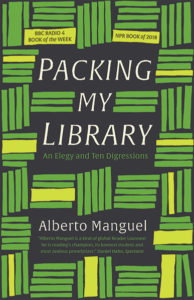 (2015)
(2015)
In Packing My Library, the author opens his library to the reader, discussing its evolution as something deeply connected to his life. The book starts as Manguel once again has to move his books. In this instance, he is moving from France to his current home in Argentina, where he will start a new job as the director of the national library, a role his mentor and friend Borges held when they first met. The book is written in ten digressions of reading. Still, it ends up being an elegy to the social importance of libraries, as free spaces, upholders of justice, and freedom.
Nonfiction and Biographies
 Bride of Frankenstein (1997)
Bride of Frankenstein (1997)
An in-depth exploration of the iconic film character. Manguel discusses the influence of the bride of Frankenstein as a feminist, literary, film, and horror icon much more significant than its famous predecessor film. In the book, the mythology around the tale of the monsters of Frankenstein are analyzed and discussed as a literary phenomenon that transcends cultures, and religion and how Mary Shelley revolutionized these ideas with her book.
Kipling: A Brief Biography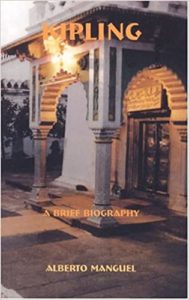 (2001)
(2001)
A biography of Rudyard Kipling, Manguel explores the life of the English author and his influence in the colonial mentality towards India. Demonstrating the intricate ups and downs of Kipling’s life and career, Manguel traces the creative mind of the author.
With Borges (2004)
(2004)
In 1964, a blind and aging writer approached young Alberto Manguel, then a bookseller, asking if he would be interested in a part-time job as a reader. Thus began one of the most fruitful and exciting literary mentorships and friendships in modern times. The writer was Jorge Luis Borges, one of Argentina’s most influential artists of the contemporary era. In this part-biography, part-memoir book, Manguel recounts his friendship with Borges, as well as giving the reader an insight into the writer’s life as a whole, chronicling their conversations over literature, life, and the duty of the artist in times of unrest.
Novels
News From a Foreign Country Came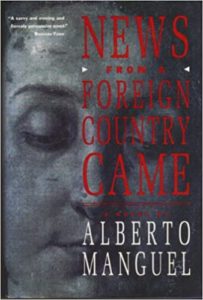 (1991)
(1991)
Written after Manguel was informed that a beloved high school literature teacher had denounced several of his students as rebels to the military authorities. Those students were systematically imprisoned and tortured, and some even died. Manguel explores the origins of human evil and what would lead someone to commit horrific feats of violence against others.
All Men Are Liars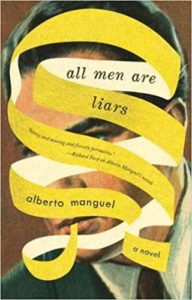 (2012)
(2012)
Written as a series of interviews about the life of Alejandro Bevilacqua, a South American author of the novel In Praise of Lying. As the main character, an investigative reporter, tries to learn more about the elusive figure, he finds himself tangled in questions much more significant than his initial search. An exploration of truth, authorship, and the agency of ideas, this beautiful novel will make you rethink the way you read a book.
Source : Reading Pathways: Alberto Manguel














